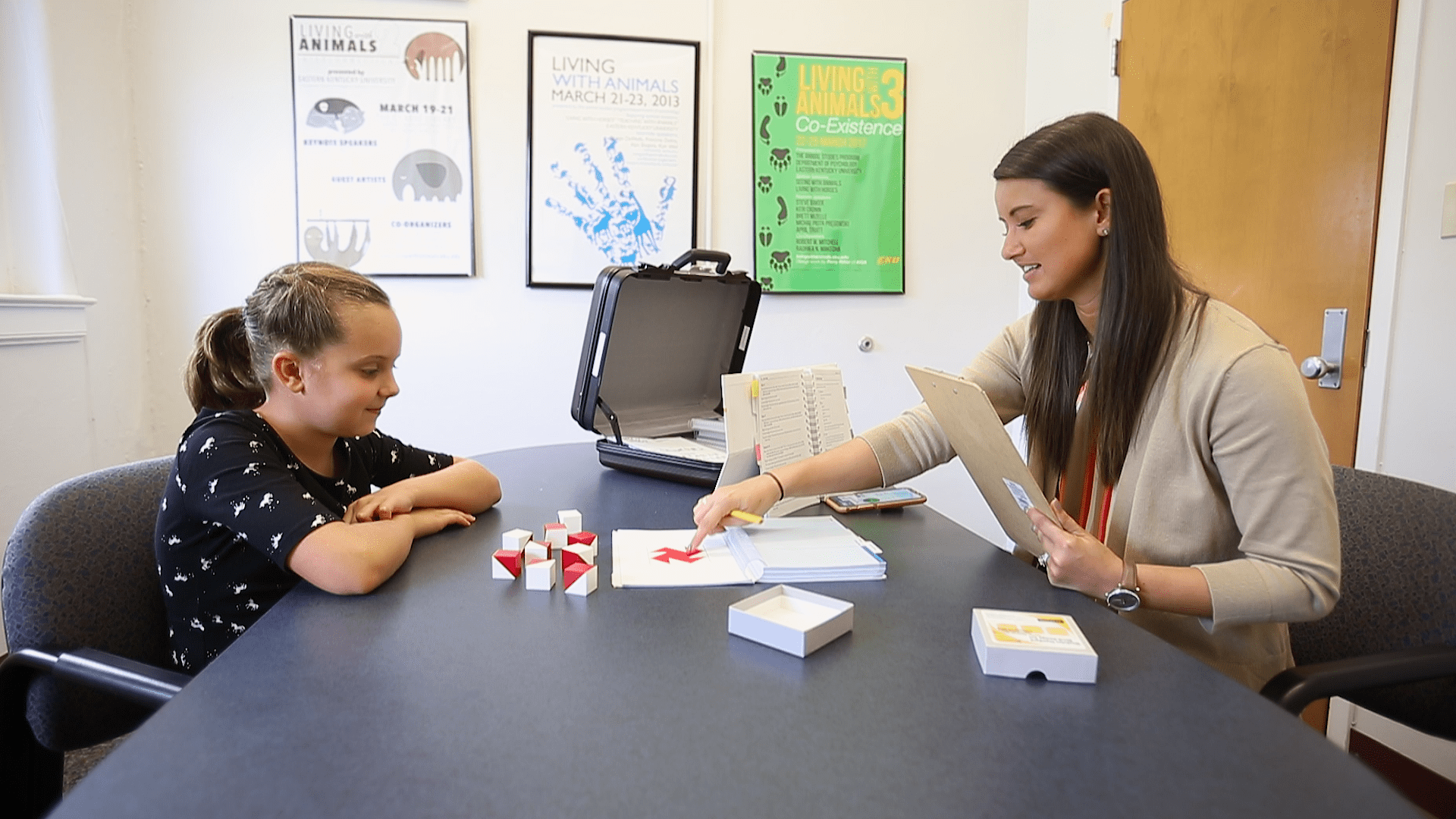- Autism diagnostic assessment
- Individual therapy for children, adolescents, or adults with Autism or other neurodevelopmental needs
- Behavioral consultation for children, adolescents, or adults with Autism
- Child Autism Spectrum Disorder Group and Adolescent Autism Spectrum Disorder Group. (These groups are typically updated, add new themes and goals, and accept new participants each semester. For more information please call the EKU Psychology Clinic at 859-622-2356)
- Parents with children who have Autism group.
- Assessment and individual therapy for: Intellectual Disability, Communication Disorders, Attention-Deficit/Hyperactivity Disorder (ADHD), Motor Disorders, Specific Learning Disorders in Reading, Writing, or Mathematics
*The EKU Psychology Clinic receives a high volume of Autism diagnostic assessment cases. Due to this we do offer a waiting list to secure a placement. For more information about applying for services and the current wait time for an Autism diagnostic assessment please call 859-622-2356.

What is Autism Spectrum Disorder (ASD)?
ASD can affect how a person socializes, their perception, how they learn, their social behaviors, and their communication skills. The term “spectrum” refers to how symptoms can vary in both presentation and severity from person to person. Symptoms are often first displayed in early childhood (typically around age 2). There is no definitive medical test to diagnose Autism, but specialized mental health professionals can assess children, adolescents, and adults to determine if a person meets diagnostic criteria for ASD. Direct intervention to address the individuals specific needs can aid in decreasing any problems that may be caused by the presenting characteristics of ASD. At home or guardian support is crucial to promoting positive outcomes. Examples of ASD characteristics that may be displayed are:
- Not making eye contact
- Wanting to be alone
- Prefer to not be held or cuddled
- Be unaware when others talk to them
- Have difficulty interacting socially with others
- Have difficulty understanding age appropriate social cues
- Repeat words or phrases that are said to them
- Have difficulty adapting to and resisting change
- Display great interest and knowledgeable in a specific topic
- Having limited verbal ability
- Delayed or behind on appropriate developmental milestones
There is no empirical evidence that vaccines cause or contribute to Autism Spectrum Disorder. More information about this can be found on the Center Disease Control and Prevention website. More information about ASD can be found on the Mayo Clinic website.
What is ADHD?
Attention-Deficit/Hyperactivity Disorder is a presentation of symptoms that may decrease attention, increase hyperactive/impulsivity, or a combination of the two. Often identified in school age children when they become disruptive in class or have difficulty with schoolwork. Approximately 8.4% of children have some classification of ADHD. ADHD symptoms may persist into adulthood, but with learning coping strategies and other medical intervention symptoms may be effectively managed.
- Difficulty paying attention or making “careless” mistakes
- Difficulty staying focused
- Does not appear to listen when spoken to
- Difficulty following instructions
- Difficulty organizing
- Easily distracted
- Fidgeting or hand/feet tapping
- Difficulty staying seated in class
- Difficulty doing activities quietly
- Difficulty waiting for their turn
What is Intellectual Developmental Disorder?
Intellectual Developmental Disorder (IDD) or Intellectual Disability, effects both intellectual and adaptive functioning in conceptual, social, and practical areas of functioning. These children often have difficulty with simple tasks of daily living and have deficits in their reasoning ability, planning, judgement, and learning. In addition to decreased intellectual ability, symptoms may include deficits in:
- Age appropriate behaviors that are involved in daily functioning (Such as: grooming, making friends, and following rules)
- Communication skills
- Interpersonal skills
Special education programs with focus on building skills to cope or manage their deficits may contribute to positive outcomes for a healthy, happy, and relatively independent life. More information about IDD can be found on the American Association on Intellectual and Developmental Disabilities website.
What are Specific Learning Disorders?
Specific Learning Disorders (SLD) impact a person’s ability to learn and preform in a specific area of academic functioning, including reading, writing, or math. As SLD may affect a person’s academic performance it can also lead to greater risk of psychological distress, poorer mental health, unemployment, or dropping out of school. Symptoms may include:
- Slow or difficulty reading
- Difficulty understanding what they just read
- Difficulties with spelling or grammar
- Errors in calculating numbers or may have problems retaining number facts
- Decreased ability to apply math concepts or procedures
Identifying areas of difficulty and providing intervention can aid the person in developing skills to decrease the impact of their deficits. Obtaining accommodations through an Individualized Education Program (IEP) may be beneficial in developing these skills, but can also provide additional time or other helpful accommodations for the individual so that they are able to perform at a level that represents their actual ability. More information about SLD can be found on the American Psychiatric Association website.
What is a Developmental Delay?
Developmental delay or also known as Global Developmental Delay (GDD), is when a child under the age of 5 and is not meeting typical milestones in intellectual functioning. At this age these children are too young to take the standardized testing needed for an intelligence assessment. Though this diagnosis can be given to children who meet this, they should be assessed again in the future when they are old enough to participate in an intelligence assessment. Examples of GDD characteristics that may be displayed are:
- Difficulties communicating by 6 months
- Difficulty sitting upright by 8 months
- Not able to crawl or walk by 12 months
- Difficulties with fine motor skills
More information about GDD can be found on the Hassenfeld Children’s Hospital website.